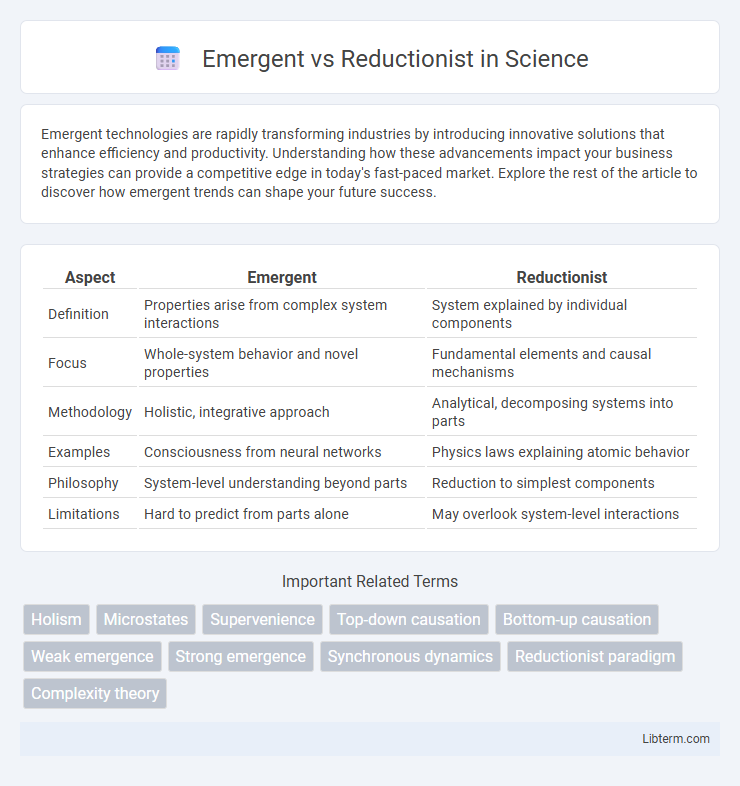Emergent technologies are rapidly transforming industries by introducing innovative solutions that enhance efficiency and productivity. Understanding how these advancements impact your business strategies can provide a competitive edge in today's fast-paced market. Explore the rest of the article to discover how emergent trends can shape your future success.
Table of Comparison
| Aspect | Emergent | Reductionist |
|---|---|---|
| Definition | Properties arise from complex system interactions | System explained by individual components |
| Focus | Whole-system behavior and novel properties | Fundamental elements and causal mechanisms |
| Methodology | Holistic, integrative approach | Analytical, decomposing systems into parts |
| Examples | Consciousness from neural networks | Physics laws explaining atomic behavior |
| Philosophy | System-level understanding beyond parts | Reduction to simplest components |
| Limitations | Hard to predict from parts alone | May overlook system-level interactions |
Understanding Emergent and Reductionist Frameworks
Emergent frameworks emphasize that complex systems exhibit properties and behaviors not predictable from their individual components, highlighting patterns arising from interactions. Reductionist frameworks analyze systems by breaking them down into fundamental parts to understand the whole through its simpler elements. Understanding both approaches allows researchers to balance analyzing detailed constituent elements with recognizing novel, collective phenomena in fields such as biology, physics, and cognitive science.
Historical Development of Emergent and Reductionist Thought
Emergent and reductionist thought evolved through distinct historical trajectories, with reductionism rooted in the scientific revolution of the 17th century, epitomized by figures such as Rene Descartes and Isaac Newton who emphasized breaking down complex phenomena into simpler components. Emergentism gained prominence in the 19th and 20th centuries, influenced by systems theory and philosophers like George Henry Lewes and later, complex systems scientists, who argued that new properties arise at higher levels of organization that cannot be predicted from their parts alone. The interplay between these views shaped fields such as biology, psychology, and philosophy of mind, driving ongoing debates about the nature of complexity and causality.
Core Principles of Reductionism
Reductionism relies on the principle that complex systems can be understood by analyzing their simpler, constituent parts and their interactions. It emphasizes decomposition, positing that the behavior and properties of the whole emerge directly from the sum of its parts. Core to reductionism is methodological analysis, where scientific explanations reduce phenomena to fundamental components such as particles, molecules, or basic biological units.
Fundamental Concepts in Emergentism
Emergentism centers on the fundamental concept that complex systems exhibit properties and behaviors not predictable from their individual components, emphasizing holistic interactions and novel qualities arising at higher levels of organization. This contrasts with reductionism, which explains phenomena exclusively through the properties and laws governing simpler constituent parts. Key principles in emergentism include irreducibility, where emergent properties cannot be deduced from lower-level processes, and downward causation, highlighting how higher-level structures influence and regulate component interactions.
Key Differences Between Emergent and Reductionist Approaches
Emergent approaches emphasize understanding complex systems by studying properties and behaviors that arise from interactions within the whole, which cannot be fully explained by analyzing individual components alone. Reductionist approaches break down systems into their smallest parts to understand the fundamental mechanisms, assuming system behavior is the sum of its parts. Key differences include emergent science's focus on holistic patterns and non-linear dynamics versus reductionism's emphasis on linear causality and component-level analysis.
Advantages and Limitations of Reductionism
Reductionism offers precise analysis by breaking complex systems into simpler components, enabling detailed understanding of individual parts and their functions. This approach facilitates experimental control and reproducibility, making it invaluable in fields like molecular biology and physics. However, it can overlook emergent properties and interactions within systems, limiting its ability to explain phenomena arising from component integration and complex system dynamics.
Strengths and Challenges of Emergent Explanations
Emergent explanations excel in addressing complex systems by capturing novel properties and behaviors that arise from the interactions of simpler elements, providing a holistic understanding unattainable by reductionist approaches. They effectively handle the unpredictability and self-organization evident in biological networks, social dynamics, and consciousness, highlighting system-level patterns. Challenges include the difficulty in precisely defining emergent properties, limited predictive power due to system complexity, and the struggle to link emergent phenomena back to their fundamental components for causal explanation.
Real-World Examples: Emergence vs Reductionism
Emergent properties in ecosystems, like the self-organizing behavior of ant colonies, illustrate how complex patterns arise from simple individual actions, which reductionism cannot fully explain. In contrast, reductionist approaches in molecular biology break down cellular processes into gene functions, enabling precise manipulation for medical innovations. Understanding phenomena such as consciousness requires integrating both emergent perspectives and reductionist analyses to capture the whole system beyond isolated components.
Impact on Scientific Research and Methodology
Emergent phenomena highlight the importance of studying complex systems as wholes, revealing properties that cannot be predicted by analyzing individual components alone, thus challenging purely reductionist approaches in scientific research. Reductionist methodology, which breaks down systems into simpler parts, remains essential for understanding fundamental mechanisms but often overlooks the interactions and synergies that produce emergent behaviors. Integrating emergent perspectives into scientific methodology promotes more holistic models, improving accuracy in fields such as biology, neuroscience, and social sciences by accounting for multi-level causality and system dynamics.
Future Perspectives on Emergent and Reductionist Paradigms
Future perspectives on emergent and reductionist paradigms emphasize the integration of both approaches to tackle complex scientific challenges, fostering advancements in fields such as systems biology and artificial intelligence. Emerging technologies like quantum computing and advanced data analytics will enhance understanding of emergent properties that cannot be predicted solely through reductionist methods. Collaborative frameworks are expected to evolve, leveraging the strengths of reductionism's detailed analysis and emergence's holistic insights to drive innovation and discovery.
Emergent Infographic

 libterm.com
libterm.com